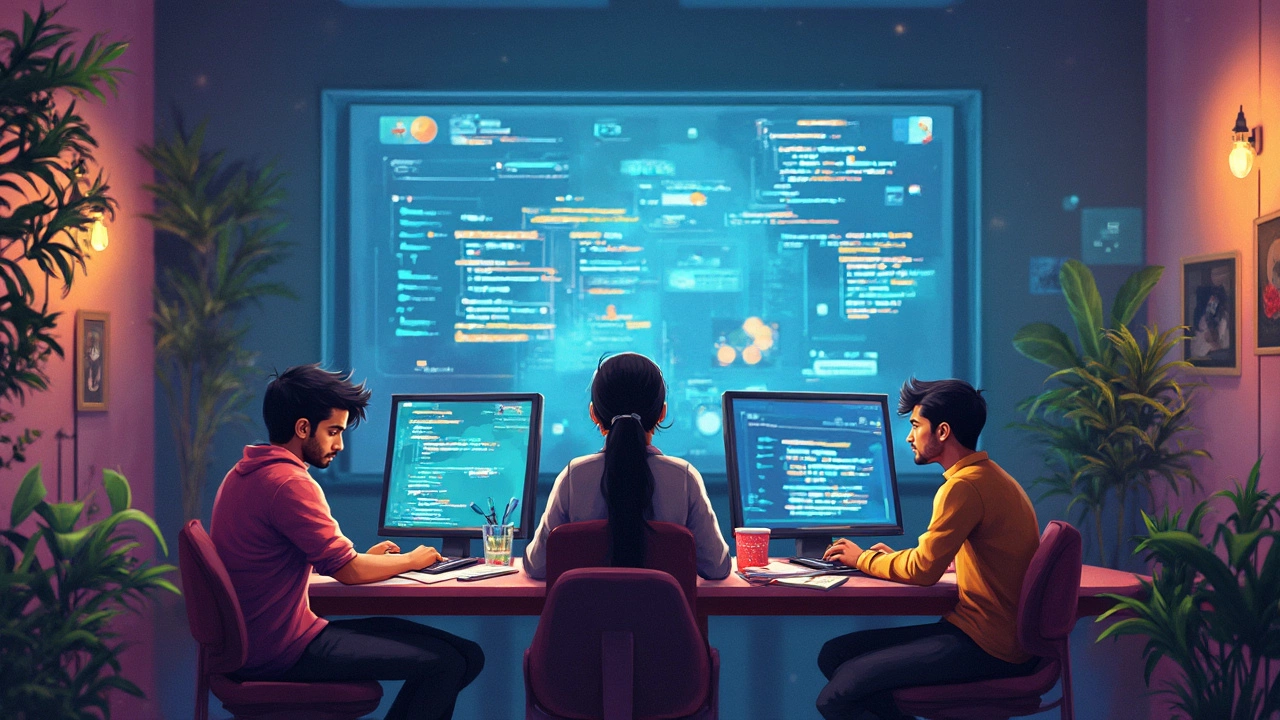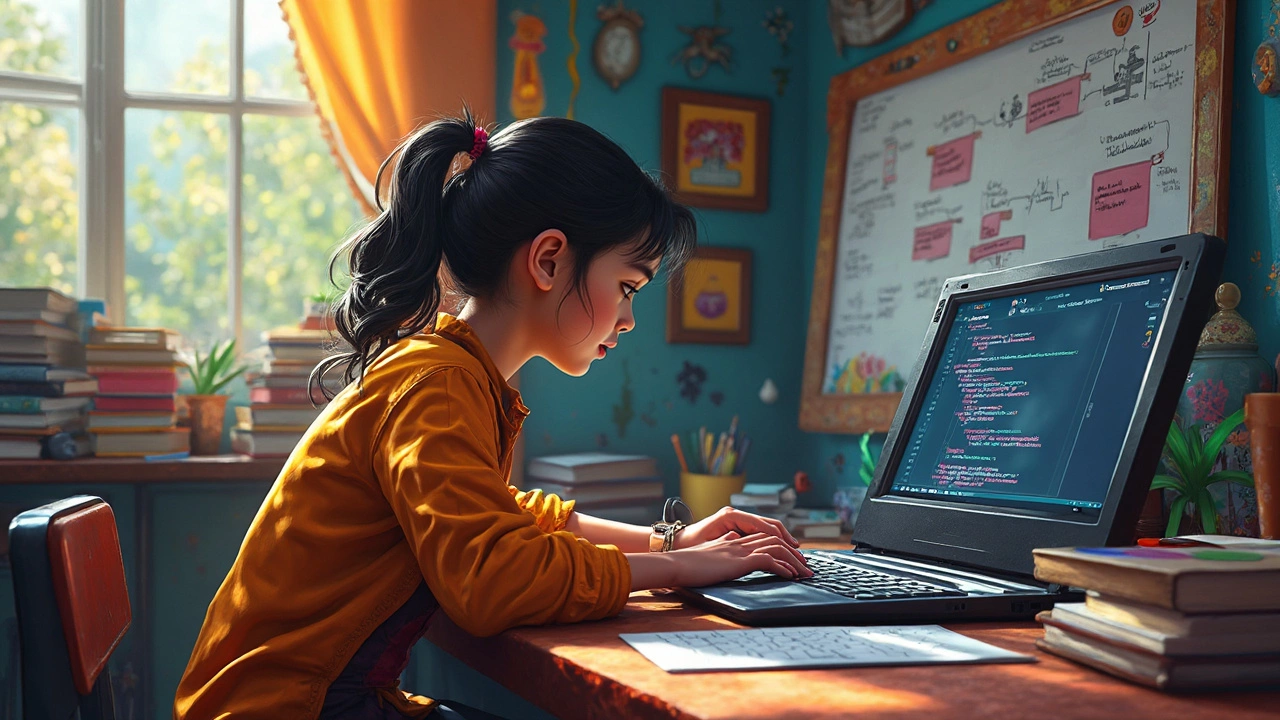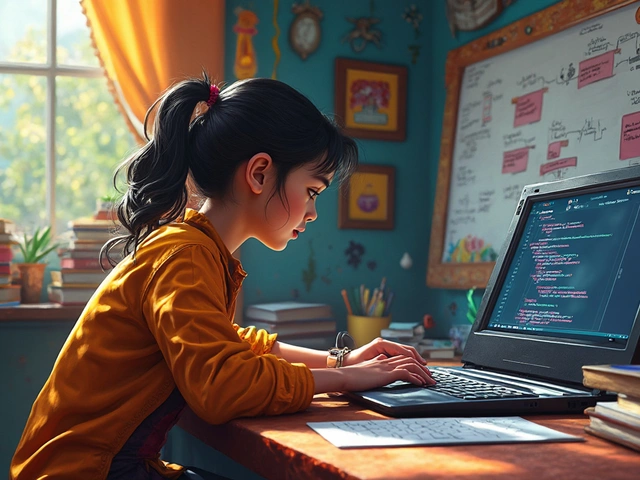Ever wondered if programming and coding are the same thing? You’re not alone. It’s like calling all rectangles squares, and while they’re related, they’re not identical. Coding is what most people visualize: writing lines of code, solving bugs, bringing apps to life from the ground up, like a digital craftsman chiseling away at a masterpiece.
Programming, though, is the mastermind behind it all. It’s the whole strategic process. Think of it as the architect who designs the blueprint, handling everything from planning and algorithms to ensuring the final product meets user needs. It’s broader, with a focus on creating systems that work smoothly, neatly wrapping coding within its responsibilities.
- Understanding Coding
- Diving into Programming
- Key Differences Explained
- Why Does It Matter?
- Getting Started with Coding and Programming
Understanding Coding
Coding, in its simplest form, is like learning a language but for computers. When you're coding, you're giving instructions to a computer in a language it understands, such as Python, JavaScript, or C++. These languages have their own grammar rules, known as syntax; get them wrong, and your computer throws an error tantrum.
Steve Jobs once said, "Everyone in this country should learn how to program a computer...because it teaches you how to think."
He was onto something. When you start coding, every line you write needs to be logical, even if it’s as simple as making a webpage show the correct heading.
What's interesting is that coding often involves understanding the 'fiddly bits.' As you write code, you're also debugging, or finding errors, which is half the battle. This increases your problem-solving skills over time.
Wanna know something cool? According to a Stack Overflow survey, around 40% of professional developers code outside their regular jobs. This hobbyist spirit can fuel creativity and foster a continuous learning attitude, beneficial for beginners joining coding classes.
In summary, if you can grasp coding, you're on the way to being a digital communicator. It's not just about lines of text; it's about making ideas happen through technology, and that's pretty powerful.
Diving into Programming
Alright, let's get into what programming is really about. Imagine programming as the whole process of crafting software—it's a bit like directing a movie. You're not just there for the fancy stuff (actors, action scenes) but orchestrating everything from casting to editing.
The programming journey kicks off with problem-solving. Programmers identify an issue and start mapping out solutions. This involves creating algorithms, which are like a series of steps to solve a problem. It’s about logic, planning, and making sure things flow smoothly.
Once the plan's set, programmers choose the right coding languages or tools. They then begin the process of coding, piecing together the lines of code that bring a project to life. It's here that coding enters the picture, acting as one part of the wider programming puzzle.
Now, let’s talk about testing and debugging. This is when programmers run tests to ensure everything works as expected. If something's wonky, they tweak (or debug) the code until it behaves. It's a crucial step in building rock-solid software!
A fun fact: according to a recent poll, around 70% of programming time actually goes into debugging and testing. Coding might seem glitzy, but perfecting the program takes the lion's share of the effort.
Finally, there's deployment and maintenance. This is where the program rolls out to users. But it's not over—programmers keep tabs on how it performs, updating and fixing it as needed. A programmer's work is never truly done, as tech and user needs are always evolving.

Key Differences Explained
Alright, let's break it down. When it comes to coding, we’re talking about translating human ideas into a language that computers can understand. It’s like writing a big language translation exercise where 'Hello, world!' becomes something like console.log('Hello, world!'); in JavaScript.
On the other hand, programming is a more comprehensive process. It’s like being the director of a film. You plan the scenes, decide what the whole movie is about, and handle any drama — like budget issues — along the way. This includes deciding which coding languages to use, defining software architecture, and coordinating how everything should function together.
Here's a quick snapshot of what sets them apart:
- Scale of Work: Programming is the big picture; coding focuses on the details.
- Problem-Solving Scope: Coding tackles specific problems, while programming covers system designs.
- Tools Involved: Coders use text editors, IDEs; programmers might use project management tools, debugging software.
- Skill Sets: Coders need language proficiency; programmers need logical thinking and problem-solving skills.
In a nutshell, while coding is a subset within the programming universe, programming encapsulates the full problem-solving journey — from conception stage to the finished product, ready to hit the stage.
Why Does It Matter?
Understanding the difference between programming and coding is more than just a technicality—it’s crucial for anyone stepping into the tech world. First off, knowing this difference can save you a ton of time and energy in choosing the right path or course when you start learning.
When beginners search for tech education or coding classes, they often wonder what they’re signing up for. If you’re aiming for roles like a software developer or technical lead, focusing primarily on programming is key. It involves strategic thinking, planning, and a lot of problem-solving, beyond just writing lines of code.
Coding is all about the execution—writing correct syntax and commands so the computer does what it's supposed to. On the other hand, programming includes analyzing problems, designing solutions, and sometimes managing team projects. Knowing what you’re diving into helps set realistic expectations for your time and career.
The job market reflects this difference too. Companies often look for programmers who can write code and also have a broader understanding of software development. A survey from 2024 showed that 80% of tech job listings required programming skills involving planning and management, not just coding-alone roles.
So, what does this mean for you? Well, having both skills can make you way more versatile and employable. Understanding programming concepts helps improve your coding skills, and having solid coding chops can make the programming process faster and more efficient. It’s like having a double-edged sword in your tech arsenal, giving you the confidence to tackle a broader range of projects.

Getting Started with Coding and Programming
Jumping into the world of coding and programming might seem a bit overwhelming at first, but it’s a journey that offers exciting challenges and opportunities. Start simple. If you're new to the scene, consider beginning with a friendly language like Python. It's known for being easy to read and gaining popularity for its versatility—from web applications to data analysis.
Once you've got a handle on coding basics, expand to programming. This involves learning how to design a program’s structure and thinking critically about solving real-world problems. Here’s a quick roadmap to get you started:
- Pick a Language: Stick to one language initially. Apart from Python, HTML and JavaScript are great for web development, while Java is a staple in enterprise environments.
- Online Courses: There are countless platforms like Codecademy, Coursera, and Udemy offering beginner to advanced courses in both programming and coding. Use them to lay down your foundation.
- Hands-On Practice: Use platforms like LeetCode or CodeChef to practice coding challenges. Real practice solidifies what you learn.
- Projects: Start with small projects, like a personal blog or a simple game. Creating actual projects will give you practical experience that theory can't provide.
- Join a Community: Engage with communities on Reddit or Stack Overflow. There's nothing like learning from those who've been around longer.
Getting comfortable with programming concepts will take time, but being patient and consistent is key. Remember, every expert was once a beginner. So, give yourself grace, keep pushing forward, and soon you'll see strides in your progress.








